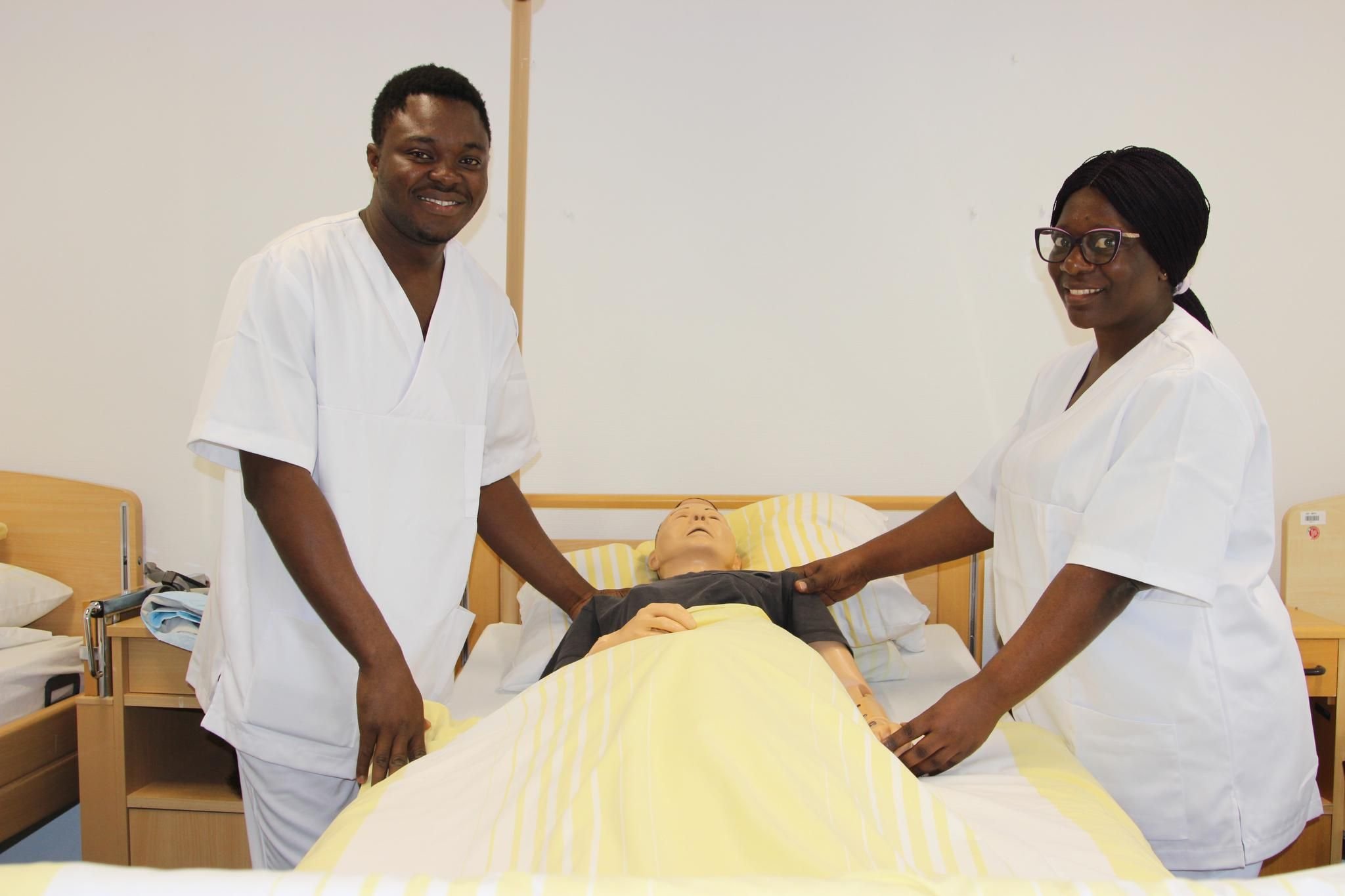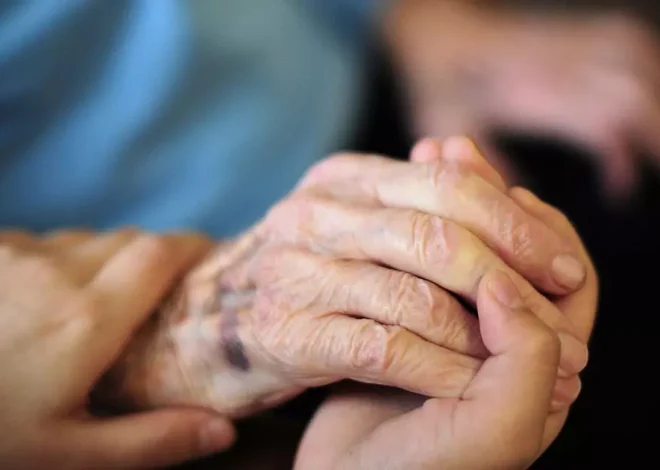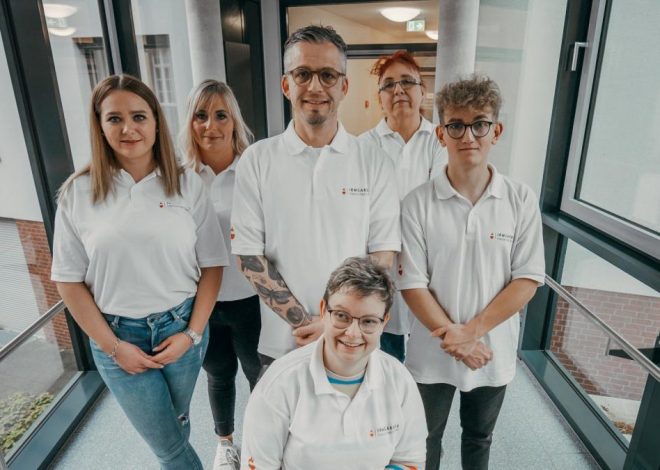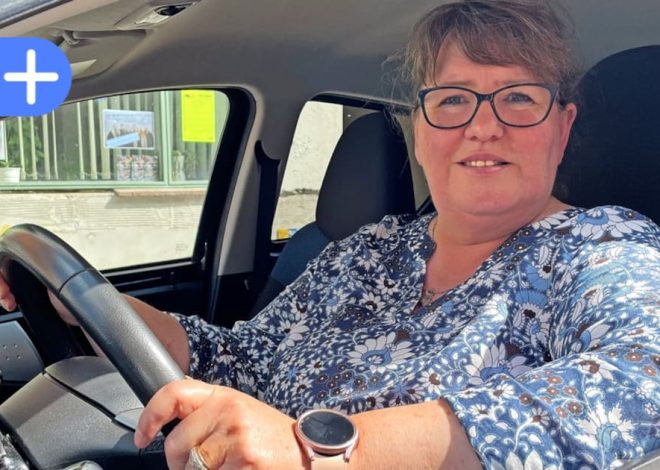
Who will care for us tomorrow
Many skilled workers have left the nursing profession in recent years. This is not surprising, as nursing is a tough job. So who is still willing to do it? Who are the people who are currently starting nursing training full of enthusiasm? Who is prepared to care for us when we are old and sick?
They are people like Eveline Fotsa and Bawoumondom Abalo Fadel-Lah. Three months ago they came to Germany to complete a one-year training course as health and nursing assistants at the ZfP Südwürttemberg. 37-year-old Fotsa comes from Cameroon, 24-year-old Fadel-Lah from Togo. Together with their two trainers, they are sitting at the table at the health and nursing assistant school in Bad Schussenried to tell their story.
Eveline Fotsa has done voluntary work for an outpatient care service in her home country of Cameroon. She has also worked as a learning assistant in a primary school. Her dream has always been to work either in care or at a school, she says in her still somewhat halting German. In her home country, however, there are no well-paid jobs in these areas and no good training either. She came across the training at ZfP Südwürttemberg on the Internet and applied.
Four children left behind in Cameroon
In order to make her dream come true, she not only learned German beforehand, but also left her four children with her husband and sister. They are, she says, six, five, three years old and eight months old. As soon as she has completed her training and is earning her own money, she wants to bring her family to Germany – and after the one-year training as a nursing assistant, she will definitely train to become a nursing professional. “If I can, I’ll stay here,” she says, smiling shyly.
Although the training has only been going on for three months, she has already learned a lot. “In Cameroon, if a person hears voices in their head, they say they are under a spell,” explains the African. “Here I have not only learned that it is a diagnosed illness, but that the symptoms can be treated and improved with medication.”
Targeted search on the Internet
Fadel-Lah also searched the internet specifically for his dream job in Germany. He saw videos on YouTube and Instagram and that’s how he came across the ZfP. He enjoys spending time with older people, he says. His grandmother is one of his favorite people. That’s why it was clear to him that he wanted to work in caring for seniors.
In Togo, he had already worked in a hospital for a year and – due to communication difficulties, it was not entirely clear during the conversation – he had completed some kind of training in this field. “But there you only learn practically, there is no theoretical teaching like here, and that is so important,” he says. “Since I’ve been here, I’ve already learned so much at school.” He also wants to stay in Germany permanently, if it works out, and train to become a nursing professional in the medium term.
Almost daily inquiries from abroad
Sitting opposite them are two of their most important contacts in Germany: Katharina Härle, practice coordinator for Bad Schussenried, Riedlingen and Biberach and course leader for health and nursing assistance at ZfP Südwürttemberg and Andrea Fessler, head of the health and nursing assistance school and the vocational school for nursing in Zwiefalten.
They report that they receive requests for training positions from abroad, often from Africa, almost every day. “We do not advertise specifically abroad and we do not work with any agencies that provide us with prospective nursing staff,” says Härle. It is important to her to emphasize this.
This is nothing other than human trafficking and we will not take part in it.”
Katharina Härle, practice coordination for Bad Schussenried, Riedlingen and Biberach and course leader for health and nursing assistance at ZfP Südwürttemberg
It now seems to be known worldwide that there is a shortage of nursing staff in Germany. And there are more and more shady employment agencies that are taking advantage of this. They charge their clients around 7,000 euros to bring them to Germany. “But then these poor people are left with nothing. They can’t speak German, they have no health insurance, nothing. This is nothing other than human trafficking and we won’t take part in it,” she says, and you can see her anger at this injustice.
Only a few meet the conditions
And even without the support of such agencies, there is no shortage of applications. She receives a call or an email from abroad almost every day. “Social media in particular plays a big role here. People specifically google for training positions in nursing and come across us,” Fessler suspects.
The problem is that only a fraction of applicants meet the minimum requirements. For example, anyone who wants to train as a health and nursing assistant must speak German at least at a B2 level, needs a recognized secondary school-like qualification and a valid measles vaccination.
Not all training positions are filled
And because one of these three points is often lacking, the ZfP was only able to fill 17 of the 18 training places in April. Eight of them came directly from abroad. 14 are still there after three months. One resigned without giving a reason. One had concealed her pregnancy and now has to take a break, a third person could not take up the place because she could not find an apartment near Bad Schussenried.
Recommended articles
“The fact is that nursing assistants are becoming more and more important because we are lacking skilled nursing staff. As the documentation requirement is increasing, skilled workers are spending more and more time at their desks, while nursing assistants are working with patients the whole time,” says practice coordinator Katharina Härle. It is therefore extremely important to train nursing assistants well. And on the one hand, she and her colleagues are very happy to find such motivated trainees as Fotsa and Fadel-Lah. However, it also presents them with many challenges.
Cultural differences in care
“For example, it is unusual among Muslims for a man to wash a woman and vice versa. But for us, it is normal. And during Ramadan, for example, a devout Muslim is not allowed to rinse his mouth with water. These are cultural differences that we are learning more and more about and that we have to adapt to in training,” says Fessler.
In many cases, the lack of German language skills is also a problem. No one spends as much time with patients or residents as the nursing assistants. They take them for walks, wash them, help them eat or get dressed. “How they experience the person being cared for, what needs they express – communicating this to the professionals and documenting it is essential in order to offer good care. If you then don’t have the words to express this, it is difficult,” Härle summarizes.
Language support would be important
The simplest solution to this would be to integrate language training into the training. But there are no German teachers on the open job market anymore. The demand in Germany is currently too great. “And what’s more, the trainees learn so much every day in class and in everyday life that their capacity to absorb is usually completely exhausted,” adds Fessler.
Nevertheless, without young talent from abroad, many training places would not be filled. So it is a matter of finding a middle ground. Recognizing cultural differences and introducing the skilled workers of tomorrow to the German way of life and language.
The ZfP has now hired an integration specialist who helps the newcomers with official matters and attends festivals with them and practices Swabian. Since the school is in Bad Schussenried and many of the trainees live there, they will soon be attending the children’s and local festival together. At the end of the conversation, Eveline Fotsa, with a broad grin on her face, says the first Swabian phrase she learned: “I gang schaffa”.

Ethel Purdy – Medical Blogger & Pharmacist
Bridging the world of wellness and science, Ethel Purdy is a professional voice in healthcare with a passion for sharing knowledge. At 36, she stands at the confluence of medical expertise and the written word, holding a pharmacy degree acquired under the rigorous education systems of Germany and Estonia.
Her pursuit of medicine was fueled by a desire to understand the intricacies of human health and to contribute to the community’s understanding of it. Transitioning seamlessly into the realm of blogging, Ethel has found a platform to demystify complex medical concepts for the everyday reader.
Ethel’s commitment to the world of medicine extends beyond her professional life into a personal commitment to health and wellness. Her hobbies reflect this dedication, often involving research on the latest medical advances, participating in wellness communities, and exploring the vast and varied dimensions of health.
Join Ethel as she distills her pharmaceutical knowledge into accessible wisdom, fostering an environment where science meets lifestyle and everyone is invited to learn. Whether you’re looking for insights into the latest health trends or trustworthy medical advice, Ethel’s blog is your gateway to the nexus of healthcare and daily living.





